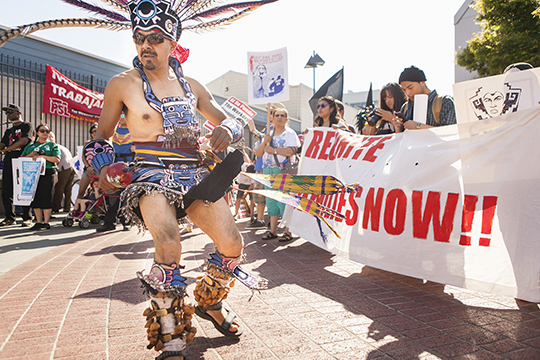Photos by Tim Daw
Members of BART’s three striking unions gathered, rallied, and picketed outside the Lake Merritt BART station in Oakland for much of today, many of them still openly grappling with yesterday’s surprising turn of events that put them in the position of going out on strike for the second time this year.
As BART spokesperson Alicia Trost and SEIU Local 1021 President Roxanne Sanchez both confirmed this morning on KQED’s Forum, it was the district’s 11th hour demand for more authority to set work rules that caused negotiations to break down after days of intensive talks had gotten the two sides close to an agreement on the other issues.
BART officials such as Trost and BART Board President Tom Radulovich (who hasn’t yet returned our call for comment) publicly cast the work rule issue as about the district’s ability to modernize, citing how the district is still using fax machines and paper pay stubs rather than fully converting to electronic communications, blaming the requirement to consult with unions on procedural changes.
But Local 1021 Political Director Chris Daly told the Guardian that the pair had “completely mischaracterized” the conflict, and he speculated about whether Radulovich — who must approve the contracts but hasn’t been a party to the talks — was “being lied to” by BART’s management team and labor consultant.
Daly and other union leaders say work rules such as requiring union approval for changing past practices related to scheduling, hours, and the kind of tasks workers perform are essential to protecting things like the eight-hour workday, worker safety, and whistleblowing and free speech rights.
“We had a basic framework understanding on the economics, but then BART illegally tied that to this work rule change on past practices. And what that meant for us is in order to get a reasonable economic package, we needed to swallow this poison pill,” Daly told us.
George, a train engineer at the rally who wouldn’t give us his last name, said the work rules have been developed over decades and are important to the management-worker balancing act, but that they shouldn’t be a barrier to modernizing.
“We have long term work contracts because we’re here for the long haul and the employer is here for the long haul, so we try to work these things out,” he told us, saying that the workers strongly support their union leaders and have told them, “Do not bring us back a lousy offer to vote on, do your job.”
But not all BART workers feel that way, and some have supported the district’s demand that the union put its “last, best, and final offer” up for a vote of the membership.
“I’m really pissed. Obviously there’s been a decision in our union. I don’t think the union is representing us, the [transit vehicle mechanics]. Nobody wanted to strike, not us,” said Robert Earl Bright, a BART engineer/mechanic profiled in the Guardian this summer. “None of the TVMs wanted to strike. Work rules, I have no concept.”
SEIU Local 1021 Executive Director Peter Castelli told the the Guardian that he understands the concerns of workers like Bright, but that he think most members will support the decision to strike once they get more information.
“It’s a fast evolving situation, with the stewards and union leadership saying ‘we gotta go out.’ So explaining things to our own membership takes time. But it shows the unity and how they trust their leadership,” Castelli told us.
He ridiculed statements by district officials that the unions are resisting modernizing the system. “We’re not afraid of technology, so that’s really grasping,” Castelli told the Guardian. “Some of the people in BART have technology degrees and they’re keeping the trains from wrecking, so we’re not afraid of technology.”
Instead, both Daly and Castelli said that the district was deliberately trying to provoke a strike by making a last minute demand that it knew would be unacceptable to the unions. “It’s to make us strike. The public is devastated by this, and for good reason, and we’re very sympathetic. So they’re thinking that, ‘Maybe we make them strike one more time and they’ll fold,” Castelli told us. “Our only other option is submission and surrender.”

